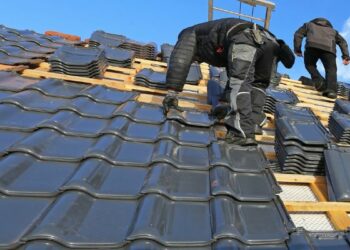Today’s homeowners have a lot of options when it comes to providing privacy and security for their properties. Some opt for vinyl fencing, while others prefer the look of wood, and more homeowners than ever are opting to install block wall fencing. Anyone on the proverbial fence about whether it’s worth investing in this unique type of masonry installation can read on to find out about a few of the benefits of block wall fencing.
Impressive Longevity
When installed professionally by experienced block wall contractors, a masonry fence can last for a century or more. Whether they’re made of precast blocks, bricks, or natural stones, masonry walls are incredibly rugged and durable. They can withstand exposure to all kinds of inclement weather events, from wind and water to constant sun, without rotting, rusting, or otherwise deteriorating.

In comparison, traditional fencing materials will hold up for no longer than a few decades, even with proper care. Of course, some fence materials are more durable than others. Aluminum can withstand wet conditions that would quickly cause wrought iron to corrode and untreated wood to rot, and vinyl fencing has high tensile strength compared to wood. However, none of them can compare to block walls when it comes to durability and longevity.
Ease of Maintenance
Block wall fencing doesn’t just last significantly longer than traditional alternatives. Fences made from this durable material also last longer without needing as much maintenance. In most environments, block fences just need to be resealed every five to ten years. There is no further maintenance required.
Resealing helps to protect the blocks themselves as well as the mortar that holds them together. Professional block wall contractors are experts at choosing mortar mixes that will withstand both the elements and the weight of the blocks, but periodic resealing provides an added layer of protection that will reduce the need for mortar repairs.
There are no other fencing materials that require as little maintenance as block walls. Wood must be repainted or restrained every two to three years, while vinyl fences tend to develop loose connections that need frequent repairs. Even chain link fences, which are known for being low-maintenance, need to have vegetation removed from around the base frequently to avoid vines, flowers, or trees displacing the links.
Design Flexibility
When most people think of block wall fencing, a specific image comes to mind of a tall, uniform wall with stone posts at either side or interspersed throughout the fence at regular intervals. However, there’s no reason that homeowners need to stick with this rigid idea of what block wall fences are and what they should look like. This material provides a huge level of design flexibility.
Most types of traditional fencing are only appropriate for flat ground. Block wall fences are different. They can be constructed in panels with decorative posts between them to accommodate slopes while simultaneously creating some extra visual appeal.
Homeowners can also choose from a wide variety of colors, textures, and designs. Block wall fences can have variable heights, feature multiple materials, accommodate stucco and other veneers, or be painted to better complement the home’s exterior and landscaping.
As long as homeowners work with a company that has experience with not just basic masonry fence construction but also advanced block wall design, the sky’s the limit. The situation with traditional fencing materials is very different. Vinyl comes in multiple colors, and wood can be painted. These materials can even be cut into different sizes and shapes. However, there is no way to completely change the appearance of the fence, as is the case with block walls, or to create designs with large variations in height and size. Only masonry fencing offers that level of design flexibility.
Aesthetic Improvements
Few families enjoy looking out from their porches to see busy city streets devoid of trees and other potential sources of visual appeal. Block wall fencing can hide anything going on in the outside world, allowing landscape designers to start with a blank canvas. Choosing the right hardscaping features, trees, flowers, and even lighting is much easier when landscape designers have complete control over the environment.
Because block wall fences offer such a great level of design flexibility, they can be viewed as aesthetic elements in their own right. A well-designed block wall adds visual interest to the landscape in an active way and can even act as a focal point in a minimalist backyard. This, in turn, can help homeowners create more beautiful yards without having to worry so much about water-hungry trees and other plants.
Greater Levels of Privacy
Masonry fences are a perfect option for homeowners who want to add privacy to their yards. They don’t just beat out decorative options like wrought iron and wood picket fences. Even wood and vinyl privacy fencing cannot compare to block walls when it comes to performance in this arena.
Block walls are sturdier than wood and vinyl, which means they can be built up taller for added protection from nosy neighbors and passers-by, and they’re completely solid. There are no convenient cracks or gaps that allow people to see into a property. The only place that anyone will be able to see into a yard with a block fence perimeter is the gate.
Maximizing privacy isn’t just about ensuring that no one can see into the yard. In busy cities and suburbs, sound can also be a major concern. While sound waves can travel easily through porous, lightweight materials like wood and vinyl, bricks, blocks, and stones are all very dense. This trait makes them much better at repelling sound, which adds an another level of privacy for families that enjoy spending time outdoors and creates a barrier to noise pollution from nearby roads.
Improved Security
Block wall fencing is the most effective form of perimeter security. Not only are block walls virtually impermeable to sight and sound, which can dissuade burglars and other potential intruders by keeping valuables from view, but they can also be built as tall as necessary to prevent break-ins.
Homeowners who want to maximize security without adding unattractive features to their properties, such as chain link fencing with barbed wire, love block walls. Some even combine block wall fencing with decorative wrought iron tips at the top to further dissuade potential home invaders.
Fire Resistance
Block walls are by far the most fire-resistant form of fencing available to today’s homeowners. While it’s true that traditional fencing materials vary in terms of flammability, none of them can stop fires in their tracks as a tall block wall can. Chain link and wrought iron sustain damage but don’t tend to burn. However, they won’t do anything to stop flames from moving from one side of the fence to the other.
Block wall fences can stop fires in their tracks. This trait can be extremely helpful to homeowners who live in areas that are prone to wildfires, providing extra time for families to prepare and evacuate and sometimes saving properties from destruction.
Potential Insurance Savings
The combination of improved security and fire resistance can result in lower homeowners’ insurance premiums. The potential savings will depend on factors such as what company homeowners use and what kinds of policies they have in place. However, most companies offer discounts for home improvements that either increase the security of the property or improve its resistance to natural disasters. Well-designed block wall fences can do both.
Increased Property Value
Homeowners who decide to install masonry fences quickly grow to love them, and so will potential future buyers. Some types of fencing, like wood, depreciate within a matter of years. Block walls hold their value much better and help homeowners fetch better prices for their properties even decades later as long as they have been well maintained.
The fact that block wall fences increase property values makes sense. After all, potential buyers have the same priorities as current homeowners. If they know that a property will offer greater levels of privacy and security, less noise pollution, and lower insurance premiums, that knowledge will factor into how much they are willing to pay.
Long-Term Savings
Let’s get something out of the way. Installing a block wall is expensive. At the very least, it costs more than installing a wood, vinyl, or chain link fence. However, homeowners who have it in the budget to build with more durable materials like blocks, bricks, or stones will find that this approach offers a better value for their money.
Masonry fences save homeowners money in multiple ways. First, they require very little maintenance, which means that there’s no need to hire contractors to repaint or repair them every few years. They outlast even the best-constructed traditional fences by eliminating fence replacement costs.
Find a Skilled Contractor
There’s only one way to reap all of the many benefits of block wall fencing, and it’s to find a highly skilled and experienced contractor. Homeowners shouldn’t settle for a fencing company that also builds block walls. They should look for specialists with dedicated experience to guarantee the best results.












